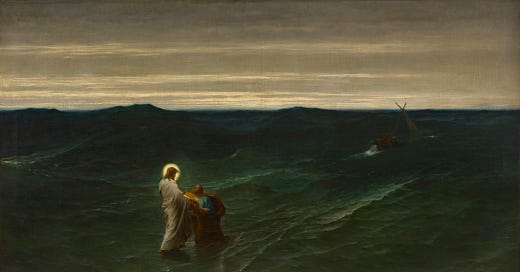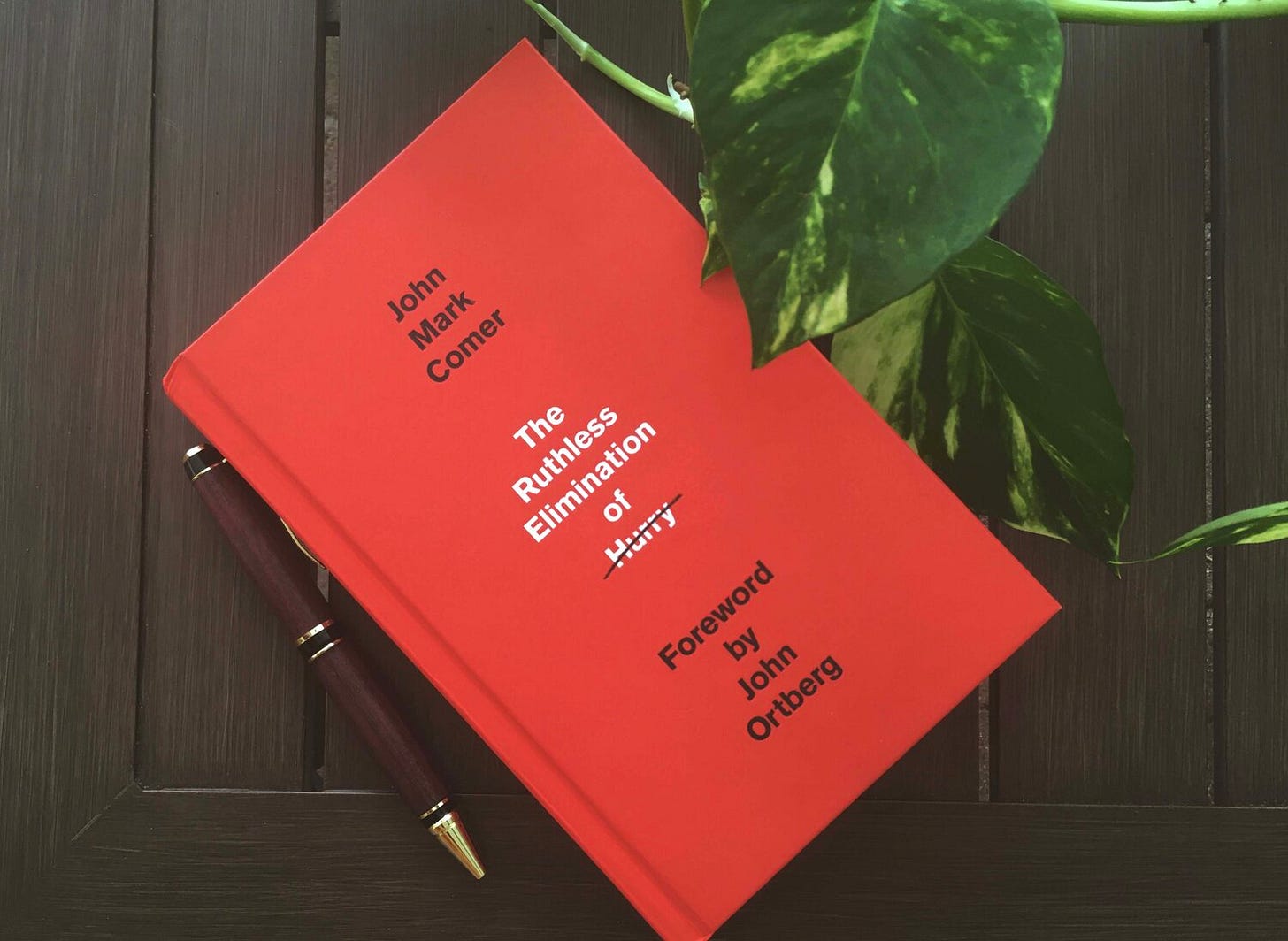Palpitations rising. A rush of heat down to your toes. Hyperventilating. Pupils dilated, galloping back and forth like frantic stallions. Clammy palms. Something is after you. You’ve been here before.
Anxiety. Panic. Fear.
These are some of the most visceral moments of the human experience. And if you’ve felt these recently, sadly, the odds are you’re in good company. Close to half of people age 18-24 in the U.S. are depressed and anxious1 after pandemic conditions caused poor mental health numbers to skyrocket.2 But even before recent globally impacting stressors, anxiety and fear have been foes Mankind can’t quite seem to put down. The Scriptures are rife with admonitions to not fear3 and live confident of the Spirit’s constant Presence and protection. But where does fear come from?
Question: Have you ever felt like you’ve got a target on your back? As if all the forces of darkness are conspiring against you? That feeling of being out in the open with no protection?
Exposed?
In the third chapter of Genesis, the LORD calls for Adam. Minor problem: Adam and Eve have just rebelled against Him. All of a sudden, a wave of realizations overtake them as their moral consciousness comes to grips with this transcendent new reality.
Evil exists. And they have just done it.
They feel broken, panicked, out in the open with no protection.
Exposed.
Man and wife hide from the Presence. Answering God’s call moments later, Adam agonizingly laments: “I was afraid because I was naked; so I hid myself” (Genesis 3:10). The Hebrew word used here is yārē', which is a primitive root (possibly by way of Assyrian?) for the basic concept of fear or moral reverence.4 What’s interesting is it can also carry the connotation of the “terrible”, “terrible thing(s)” or the “dreadful.”5 It’s used over 300 times in the Old Testament — but this is the first time. Fear and anxiety are introduced to humanity in response to their newfound, wholistic and vulnerable exposure to a fallen world.
When the disciples were in the boat one evening during a windstorm, the most incredible (and odd) thing happened: their friend the Rabbi came on the water. But without a ship or a vessel; He was on the water. Walking.
At this point, your Sunday school thumb-drive might be rebooting in the lockbox of your memory. You know what’s next. At first, they think He’s a ghost (creepy). Peter calls to Jesus, Who calls back and invites him out on the waves. After taking a few steps, Peter becomes afraid (the Greek word phobeō) and begins to sink before Christ pulls him up, chides his doubt, and gets into the boat — with the winds immediately coming to an end.
This passage is unique for a couple of reasons:
It includes one of Jesus’ encouragements to “take courage” and “not be afraid.” (Matthew 14:27)
The violent winds make Peter feel “phobeō” — which is the same word used in the Septuagint (the earliest Greek translation of the Old Testament) for what Adam felt in the Garden.6
From the root “phobos”, we get the English word “phobia” that we see in mental diagnoses left and right. Peter, with the LORD approaching, looked at the waves and felt what Adam and Eve did: vulnerable, panicked, out in the open with no protection.
Exposed.
But thank God, we don’t have to live like that.
The “Sage of Concord” himself, Ralph Waldo Emerson, always had a way with words. His hot take on the storms of life:
The wise man in the storm prays God not for safety from danger but for deliverance from fear. It is the storm within which endangers him, not the storm without.7
I don’t know what your storms are. Each of us goes through moments of anxiety or panic or depression or pointed fear. To be transparent, my wife and I have dealt with more than our share of it in the past two years. We know what it’s like to feel your peace evaporate in the heat of a moment. But the answer is always to seek God’s protection through the storm within; the storm of fear that wants to choke the life out of us. Don’t give in. Refuse it.
Take courage.
In the ancient Hebrew songbook, Psalm 91 stands distinctly for many as a beacon of hope. Interestingly, this song written by King David was likely even packaged with other exorcism psalms by the Qumran community in the Dead Sea Scrolls.8 When someone was oppressed by an evil spirit or was demonized, this song would be used to pray over them — to bring deliverance.
Here’s one part that stood out to me today:
He who dwells in the shelter of the Most High
Will abide in the shadow of the Almighty.
2 I will say to the Lord, “My refuge and my fortress,
My God, in whom I trust!”
3 For it is He who delivers you from the snare of the trapper
And from the deadly pestilence.
4 He will cover you with His pinions,
And under His wings you may seek refuge;
His faithfulness is a shield and bulwark.5 You will not be afraid (yārē') of the terror by night,
Or of the arrow that flies by day.”— Psalm 91:5
There’s that word again.
You and I don’t have to be afraid, friends. I know that’s easier said than done. But engaging the Presence of the LORD in these fragile moments is our only option. He is our shelter from the storm. A fortress against the enemy. He is the One Who delivers us and saves us from the traps of the dark kingdom. Our God shields us and protects us from the threats that rage around us.
And they will rage. But take courage. Christ has overcome the world and is greater than your anxiety, panic and fear. Rest in Him.
What do you do when you’re anxious?
I leave you with 3 things to help you meditate and reflect on overcoming anxiety today:
The full scope of Psalm 91; pray this out loud over yourself and your home today;
A song to worship and pray along with;
A book suggestion in your journey of finding peace with God.
SCRIPTURE
He who dwells in the shelter of the Most High
Will abide in the shadow of the Almighty.
2 I will say to the Lord, “My refuge and my fortress,
My God, in whom I trust!”
3 For it is He who delivers you from the snare of the trapper
And from the deadly pestilence.
4 He will cover you with His pinions,
And under His wings you may seek refuge;
His faithfulness is a shield and bulwark.5 You will not be afraid of the terror by night,
Or of the arrow that flies by day;
6 Of the pestilence that stalks in darkness,
Or of the destruction that lays waste at noon.
7 A thousand may fall at your side
And ten thousand at your right hand,
But it shall not approach you.
8 You will only look on with your eyes
And see the recompense of the wicked.
9 For you have made the Lord, my refuge,
Even the Most High, your dwelling place.
10 No evil will befall you,
Nor will any plague come near your tent.11 For He will give His angels charge concerning you,
To guard you in all your ways.
12 They will bear you up in their hands,
That you do not strike your foot against a stone.
13 You will tread upon the lion and cobra,
The young lion and the serpent you will trample down.14 “Because he has loved Me, therefore I will deliver him;
I will set him securely on high, because he has known My name.
15 “He will call upon Me, and I will answer him;
I will be with him in trouble;
I will rescue him and honor him.
16 “With a long life I will satisfy him
And let him see My salvation.”— Psalm 91
SONG
BOOK
The Ruthless Elimination of Hurry: How to Stay Emotionally Healthy and Spiritually Alive in the Chaos of the Modern World by John Mark Comer
Many of our fears and anxieties spring from our attachment to the breakneck pace of the culture we’re in. Comer does a great job here of challenging these rhythms we’ve adopted and using Scripture to reveal what we need — a return to the spiritual disciplines. Great book that’s worth your time.
[Wednesday Wonderisms is a short devotional reflection I’ll be sharing each midweek morning. Whether it’s sparked by a Scripture, a conversation with a friend, personal musings while raising my three kids or thoughts on the state of the Church, the goal is to encourage you to become an even more ardent worshiper of King Jesus. Hit the link below to share it with a friend.]
Booth, J. (2023, October 23). Anxiety statistics and Facts. Forbes Health. https://www.forbes.com/health/mind/anxiety-statistics/
World Health Organization: WHO. (2022, March 2). COVID-19 pandemic triggers 25% increase in prevalence of anxiety and depression worldwide. World Health Organization. https://www.who.int/news/item/02-03-2022-covid-19-pandemic-triggers-25-increase-in-prevalence-of-anxiety-and-depression-worldwide
See Isaiah 41:10; Philippians 4:6-7; Deuteronomy 31:6; John 14:27; Joshua 1:9; Psalm 118:6.
H3372 - yārē’ - Strong’s Hebrew Lexicon (nasb95). (n.d.). Blue Letter Bible. https://www.blueletterbible.org/lexicon/h3372/nasb95/wlc/0-1/
Ibid.
G5399 - phobeō - Strong’s Greek Lexicon (lxx). (n.d.). Blue Letter Bible. https://www.blueletterbible.org/lexicon/g5399/lxx/lxx/0-1/
Emerson, R. W. (1909). Journals of Ralph Waldo Emerson: with annotations, Volume 3 (E. W. Emerson & W. E. Forbes, Eds.). Houghton Mifflin. p. 203.
VanderKam, J., & Flint, P. (2005). The meaning of the Dead Sea Scrolls: Their Significance For Understanding the Bible, Judaism, Jesus, and Christianity. A&C Black. p. 128.










Man what a great connection - I never knew that about Adam and Eve…their visceral response. This was encouraging.
Excellent post. Thanks for the teaching on the word--phobia--Adam in the garden.